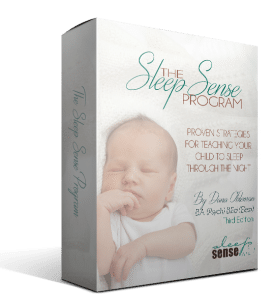As a new parent, you’ve undoubtedly heard the term “sleep regression” from a friend, parent, or anyone else you’ve talked to about the adventure you’re about to embark on. Most of these regressions are just the result of an illness or a change in environment, but the 4-month sleep regression is a different animal altogether. I’ll tell you what makes it different and how to get through it with a minimal amount of anguish in today’s video.
– Hi, I’m Dana, welcome to this week’s video.
The Four Month Sleep Regression. You know what I’m talking about. If you’ve been through it or it’s coming up, I’m going to give you some tips here today to minimize the upset that it may cause.
Now, the four month sleep regression is really the only one that I’m gonna validate. I really, I don’t think there’s a nine month, an 18 month, I mean, I think developmental changes occur in those months, but it shouldn’t really be affecting sleep too much, and if it does, it shouldn’t really last more than a week.
But the four month sleep regression has a little bit of science behind it. Around the three to four month mark, the way a baby sleeps changes pretty dramatically.
In the newborn phase, newborn babies really only have two stages in their cycle. They’re either in deep sleep, which is stage three, or they’re in REM sleep, which is rapid eye movement sleep, that’s when a lot of things are going on in their little brains, and both are very important.
Deep sleep is restorative, builds immune system, REM sleep, great for memory, and connections, neural connections, stimulating the senses, both super important, that’s why they do a lot of it. But around the third to fourth month, it switches.
Now they bring in stage one and two along with deep and REM. So they’re going from two to four stages in their cycle, and that can, for some babies, be a challenge.
You have to imagine when you’re reorganizing the way in which you sleep, that it might not go smoothly every time, or there might be a little bit of disjoint as you go through that process, and so what I see happening, especially with babies who have strong sleep-prop associations, and that would be, I nurse to sleep all the time, I’m bottle fed to sleep all the time, I am rocked to sleep all the time. Now that they’re going into some lighter stages in their cycle, they may become aware of the fact that you’re not rocking anymore, you’re not feeding anymore, and that’s gonna cause a wake up, and they’re going to be angry, because they don’t wanna be awake, they want to be asleep, but they’re not sure how to do that.
So the good news is, if you’ve been working on the Sleep Sense Program with your little one, your two month old, your three month old, you should sail through this little regression period pretty easily. You might have a week or two of, “Ah, she’s not sleeping as great as she was,” but it’s pretty mild, because they have the skills.
If you’ve got a baby who’s pretty strongly sleep-prop dependent, you’re gonna see this regression show up a lot more, especially through the night, and that’s usually when people start to think, “Hm, is there something I should be doing “to help this baby sleep well?”
That’s when they tend to start reaching out and looking for resources, or finding the program, or hiring a sleep consultant, because things are going downhill pretty fast.
The bad news is that that’s the way it’s gonna stay unless your child learns some independent sleep skills. It might get a little bit better once the initial change is complete, but if they are cycling through, through light sleep, through deep, and into REM, there’s most likely going to be at least a few times in the night where they wake up, realize the prop is not there, and cry out for the prop.
So if that sounds like you, I wanna encourage you to pick up a copy of the Sleep Sense Program, that’s gonna walk you through exactly what you need to do to teach your child some independent sleep skills.
Thanks for watching, sleep well.
If your baby, infant or toddler is having trouble sleeping through the night, help is just a click away! The Sleep Sense Program has helped over 57,00 parents to get their kids sleeping 11-12 hours through the night AND taking long, restful naps during the day. If you’re ready to get started today – I’m looking forward to helping you!










